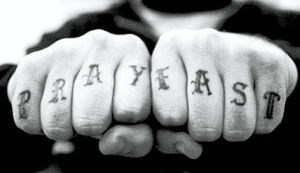This article comes on Day 19 of our special Altmuslim/Patheos Muslim Ramadan #30Days30Writers blog project, in which we are showcasing the voices of 30 Muslim leaders, activists, scholars, writers, youth and more (one on each day of Ramadan) as part of our commitment to own our own narratives and show how we are one Ummah, many voices. To demonstrate how our Ramadan experiences are shared yet unique to each of us.
Yesterday two of my Catholic friends (Stephanie and Caitlin) decided to fast the day with me. They wanted to feel the experience, have a spiritual kick and gain empathy with Muslims.
Initially, our text messages throughout the day were all about the shock of eating at 3:00 a.m., the caffeine-deprivation-induced fatigue and the on-and-off dry mouth. But when we all met after work to discuss their experiences, many deeper understandings came forth. I’ve also had these observations and epiphanies at some point in my life, but the experience with my friends made me wonder — how long has it been since I’ve reflected on my own fasts?
In these precious last weeks of Ramadan, let us all recommit to our fasts (myself, first and foremost). Perhaps we can make the most of our remaining days by reflecting daily on some of the following points made by my friends:
Community
“The community of faith is something that always evokes a strong emotional response in me. The world can be a very dark place (and a very beautiful one as well), and I think it is really important to recognize a higher power during your life to help you through the dark and celebrate the light. Any action that brings together people who are like-minded, spiritual individuals to connect over a fundamental belief in a higher power (and recognize that they are a part of something greater than themselves) is beyond words.
“Sometimes it seems as though tradition is what separates us religiously, ethnically, etc., but in reality I think these ritual traditions at their core have the same purpose and can show us how similar we all are.”
Stephanie said that knowing that she was fasting with others around the globe made her feel unified with the roughly 1.6 billion other Muslims around the world. Caitlin also said this was her most important takeaway from fasting. It made them appreciate tradition and ritual, and especially the communal aspect of those practices.
When was the last time we reflected on the vastness of the Muslim Ummah, or even made a prayer for each other? When was the last time we remember being excited for our ritual prayers and congregations?
Today, ask yourself — am I fostering my connection with the brothers and sisters in my community? In the world? Did I speak to another fellow brother or sister at iftar today, or did I eat in silence and scurry home right afterward? Am I connecting with my fasting companions in Gaza, Syria, Burma, Iraq, Nigeria, through words of supplication or activism?
Deprivation
“From a scientific perspective, it’s really cool to see what happens to your body when it goes through something it’s not used to.”
Caitlin could feel the effects of fasting after just a few hours and understood that what you do has a direct effect on how your body feels and reacts. It’s an incentive, she said, to take better care of yourself and be appreciative of what your body can do because it’s more resilient than you think.
How often do we, as Muslims, think about the miracle of the human body? Our souls rest inside bodies that work in such complex ways, about which doctors and scientists are still constantly making new discoveries.
Today, ask yourself – do I take care of my body, on loan to me from God, or did I engorge myself at iftar time? Am I going to use this tongue He gave me to respond with kindness or react with harshness?
Empowerment
“I think that I felt like committing myself to being disciplined about something uncomfortable felt empowering.”
Caitlin learned that she could control her hunger, which led her to think, “What else can I control?” She said she made an effort to control her tongue, and was very conscious of her effort to refrain from swearing at certain points of her day.
Are we thinking about how our fasting is a daily and hourly disciplinary exercise? What other aspects of our lives can we apply this discipline to?
Today, ask yourself – Am I complaining about my empty stomach to anyone will listen throughout the day? Or am I using each pang of hunger to renew my intention? Am I countering each pang of hunger with a reminder of each blessing in my life? What other aspects of my behavior could use some discipline?
Empathy
“I thought a lot about those who fast every day, but not by choice.”
Stephanie knew that, at the end of the day, she would be breaking her fast — even in the middle of the day, if she really wanted to have water or a cracker, she said she could have easily do so because those resources were readily at her disposal. Fasting made her feel more fortunate for the things she has. “When it comes down to it, the life I lead is very excessive,” she said.
Today, ask yourself – What is one thing in my life that I can probably live without? Can I limit my closet to X number of sweaters, shirts, pants and donate the rest? What are other ways I can simplify things in my life and partake in charity and charitable actions for the sake of others?
Today, ask yourself these questions.
Tahera Shireen Rahman is the producer and a host at Radio Islam, the first daily, Muslim talk radio produced for the mainstream market. She also writes a blog on her website, www.tsrahman.com.

















